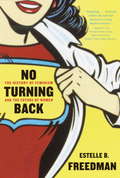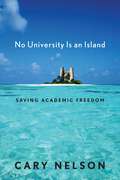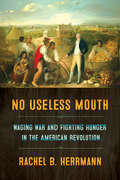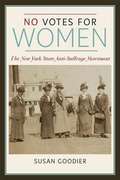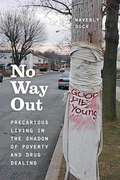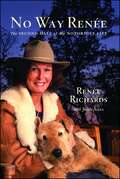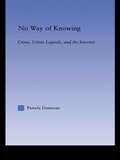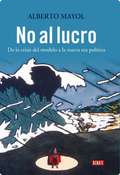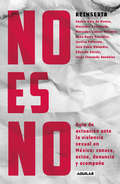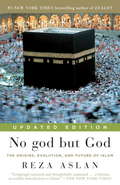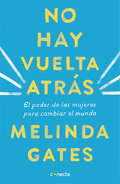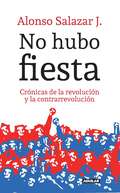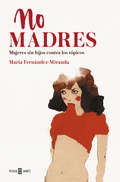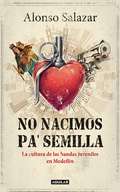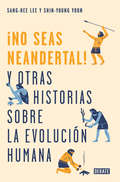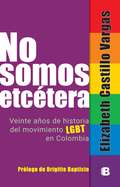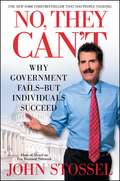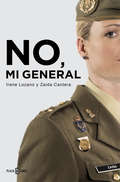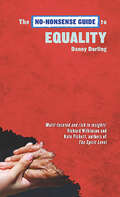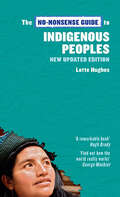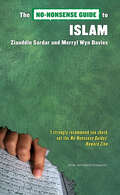- Table View
- List View
No Turning Back: The History of Feminism and the Future of Women
by Estelle B. Freedman"On the situations of women around the world today, this one book provides more illumination and insight than a dozen others combined. ... Freedman's survey is a triumph of global scope and informed precision." -NANCY F. COTT Professor of History, Harvard University. Repeatedly declared dead by the media, the women's movement has never been as vibrant as it is today. Indeed as Stanford professor and award-winning author Estelle B. Freedman argues in her compelling book, feminism has reached a critical momentum from which there is no turning back. Freedman examines the historical forces that have fueled the feminist movement over the past two hundred years and explores how women today are looking to feminism for new approaches to issues of work, family, sexuality, and creativity. Drawing examples from a variety of countries and cultures, from the past and the present, this inspiring narrative will be required reading for anyone who wishes to understand the role women play in the world. Searching in its analysis and global in its perspective, No Turning Back will stand as a defining text in one of the most important social movements of all time.
No Undocumented Child Left Behind: Plyler v. Doe and the Education of Undocumented Schoolchildren (Citizenship and Migration in the Americas #3)
by Michael A. OlivasThe 1982 U. S. Supreme Court case of Plyler v. Doe, which made it possible for undocumented children to enroll in Texas public schools, was a watershed moment for immigrant rights in the United States. The Court struck down both a state statute denying funding for education to undocumented children and a municipal school district's attempt to charge an annual $1,000 tuition fee for each undocumented student to compensate for the lost state funding. Yet while this case has not returned to the Supreme Court, it is frequently contested at the state and local level.In No Undocumented Child Left Behind, Michael A. Olivas tells a fascinating history of the landmark case, examining how, 30 years later, Plyler v. Doe continues to suffer from implementation issues and requires additional litigation and vigilance to enforce the ruling. He takes a comprehensive look at the legal regime it established regarding the education of undocumented school children, moves up through its implementation, including direct and indirect attacks on it, and closes with the ongoing, highly charged debates over the Development, Relief, and Education for Minors (DREAM) Act, which aims to give conditional citizenship to undocumented college students who graduated from US high schools and have been in the country for at least five years. Listen to Michael Olivas on WYPF 88.1 FM, as he takes a look back 30 years to the Supreme Court case that made it possible for undocumented children to enroll in public schools and the highly-charged political and legal battles that have ensued.
No University Is an Island: Saving Academic Freedom (Cultural Front #4)
by Cary NelsonThe modern university is sustained by academic freedom; it guarantees higher education’s independence, its quality, and its success in educating students. The need to uphold those values would seem obvious. Yet the university is presently under siege from all corners; workers are being exploited with paltry salaries for full-time work, politics and profit rather than intellectual freedom govern decision-making, and professors are being monitored for the topics they teach. No University Is an Island offers a comprehensive account of the social, political, and cultural forces undermining academic freedom. At once witty and devastating, it confronts these threats with exceptional frankness, then offers a prescription for higher education’s renewal. In an insider’s account of how the primary organization for faculty members nationwide has fought the culture wars, Cary Nelson, the current President of the American Association of University Professors, unveils struggles over governance and unionization and the increasing corporatization of higher education. Peppered throughout with previously unreported, and sometimes incendiary, higher education anecdotes, Nelson is at his flame-throwing best. will be the benchmark against which we measure the current definitive struggle for academic freedom.The book calls on higher education’s advocates of both the Left and the Right to temper conviction with tolerance and focus on higher education’s real injustices. Nelson demands we stop denying teachers, student workers, and other employees a living wage and basic rights. He urges unions to take up the larger cause of justice. And he challenges his own and other academic organizations to embrace greater democracy. With broad and crucial implications for the future, No University Is an Island will be the benchmark against which we measure the current definitive struggle for academic freedom.
No Useless Mouth: Waging War and Fighting Hunger in the American Revolution
by Rachel B. HerrmannIn the era of the American Revolution, the rituals of diplomacy between the British, Patriots, and Native Americans featured gifts of food, ceremonial feasts, and a shared experience of hunger. When diplomacy failed, Native Americans could destroy food stores and cut off supply chains in order to assert authority. Black colonists also stole and destroyed food to ward off hunger and carve out tenuous spaces of freedom. Hunger was a means of power and a weapon of war.In No Useless Mouth, Rachel B. Herrmann argues that Native Americans and formerly enslaved black colonists ultimately lost the battle against hunger and the larger struggle for power because white British and United States officials curtailed the abilities of men and women to fight hunger on their own terms. By describing three interrelated behaviors—food diplomacy, victual imperialism, and victual warfare—the book shows that, during this tumultuous period, hunger prevention efforts offered strategies to claim power, maintain communities, and keep rival societies at bay.Herrmann shows how Native Americans, free blacks, and enslaved peoples were "useful mouths"—not mere supplicants for food, without rights or power—who used hunger for cooperation and violence, and took steps to circumvent starvation. Her wide-ranging research on black Loyalists, Iroquois, Cherokee, Creek, and Western Confederacy Indians demonstrates that hunger creation and prevention were tools of diplomacy and warfare available to all people involved in the American Revolution. Placing hunger at the center of these struggles foregrounds the contingency and plurality of power in the British Atlantic during the Revolutionary Era.Thanks to generous funding from Cardiff University, the ebook editions of this book are available as Open Access volumes from Cornell Open (cornellopen.org) and other repositories.
No Votes for Women: The New York State Anti-Suffrage Movement (Women, Gender, and Sexuality in American History)
by Susan GoodierNo Votes for Women explores the complicated history of the suffrage movement in New York State by delving into the stories of women who opposed the expansion of voting rights to women. Susan Goodier finds that conservative women who fought against suffrage encouraged women to retain their distinctive feminine identities as protectors of their homes and families, a role they felt was threatened by the imposition of masculine political responsibilities. She details the victories and defeats on both sides of the movement from its start in the 1890s to its end in the 1930s, acknowledging the powerful activism of this often overlooked and misunderstood political force in the history of women's equality.
No Way Out: Precarious Living in the Shadow of Poverty and Drug Dealing
by Waverly DuckIn 2005 Waverly Duck was called to a town he calls Bristol Hill to serve as an expert witness in the sentencing of drug dealer Jonathan Wilson. Convicted as an accessory to the murder of a federal witness and that of a fellow drug dealer, Jonathan faced the death penalty, and Duck was there to provide evidence that the environment in which Jonathan had grown up mitigated the seriousness of his alleged crimes. Duck's exploration led him to Jonathan's church, his elementary, middle, and high schools, the juvenile facility where he had previously been incarcerated, his family and friends, other drug dealers, and residents who knew him or knew of him. After extensive ethnographic observations, Duck found himself seriously troubled and uncertain: Are Jonathan and others like him a danger to society? Or is it the converse--is society a danger to them? Duck's short stay in Bristol Hill quickly transformed into a long-term study--one that forms the core of No Way Out. This landmark book challenges the common misconception of urban ghettoes as chaotic places where drug dealing, street crime, and random violence make daily life dangerous for their residents. Through close observations of daily life in these neighborhoods, Duck shows how the prevailing social order ensures that residents can go about their lives in relative safety, despite the risks that are embedded in living amid the drug trade. In a neighborhood plagued by failing schools, chronic unemployment, punitive law enforcement, and high rates of incarceration, residents are knit together by long-term ties of kinship and friendship, and they base their actions on a profound sense of community fairness and accountability. Duck presents powerful case studies of individuals whose difficulties flow not from their values, or a lack thereof, but rather from the multiple obstacles they encounter on a daily basis. No Way Out explores how ordinary people make sense of their lives within severe constraints and how they choose among unrewarding prospects, rather than freely acting upon their own values. What emerges is an important and revelatory new perspective on the culture of the urban poor.
No Way Renee: The Second Half of My Notorious Life
by John Ames Renee RichardsIn 1975, at the age of forty, Richard Raskind, a renowned eye surgeon and highly ranked amateur tennis player, "died," and Renée Richards was "born," in what was to become the most public and highly scrutinized sex reassignment to date. It was not until Renée Richards was discovered playing in an amateur tennis tournament that the world took notice. Extensive media coverage and criticism thrust Renée reluctantly into the spotlight, sparking an intense public debate over her private life. Now, at seventy-two, Richards looks back and speaks frankly about all aspects of her complicated and often notorious life in this eye-opening, thought-provoking memoir. Richards' honest and compelling narrative explores the dichotomy between the successful life she lived as Dr. Richard Raskind, who seemed to have everything (devoted friends, a beautiful wife and son, a stellar record of academic and professional achievement, and outstanding athletic ability), and a secret life of struggle with a drive that could not be suppressed, even by years of psychotherapy and the force of a considerable will. Richards takes readers through her difficult decision to undergo surgery and the complex mixture of relief and continued frustration that came with the realization of her new identity. Discussing life after her transformation, Richards candidly relates the details, trials, and pleasures of her romantic life as well as fascinating stories about her tennis career, including her experiences as Martina Navratilova's coach. She also provides an intimate account of her difficult but rewarding relationship with her rebellious son: runaway teenager, high-stakes Vegas gambler, karate champion, and entrepreneur. She describes the deterioration of a once-loving marriage and the challenges of reclaiming her place at the forefront of her demanding medical specialty. Having lived as a woman almost as long as she lived as a man, Richards draws on a personal history that illuminates thirty years of remarkable change in society's attitude toward gender issues. Her absorbing and inspiring story, at once heartbreaking and uplifting, is a testimony to how far we have progressed in our ability to discuss and accept sexuality in all its iterations, as well as a reminder of how far we still must travel.
No Way of Knowing: Crime, Urban Legends and the Internet (Studies in American Popular History and Culture)
by Pamela DonovanExamining "old media" treatment of crime legends: news reports, fictional film and television depictions, and "new media" interactive discussions: versions and discussions circulating in Internet newsgroups and via electronic mail lists, this text examines a social context vastly changed from the height of rumour research in the mid-20th century.
No al lucro
by Alberto MayolNo al lucro es un ensayo incisivo y valiente, cuyo objetivo es analizar cómo la historia reciente de Chile ha estado rodeada de una serie de poderes ?la dictadura, la Iglesia, los políticos, entre otros? que han influido en una sociedad, según el autor, despolitizada y afín a seguir el rumbo de los acontecimientos sin despertar de una modorra cómoda e indolente. Sin embargo, luego de las recientes manifestaciones en pro de una educación de calidad, por la igualdad y por un Chile preocupado del medioambiente, y en un siglo más informado como el XXI, la ciudadanía ha sufrido un cambio profundo: una nueva era política se está desarrollando. Alberto Mayol sin pelos en la lengua da cuenta de un Chile que ha estado sometido a las leyes del mercado, pero que poco a poco está despertando dejando entrever la crisis del sistema, pero también las nuevas posibilidades futuras.
No es no: Guía de actuación ante la violencia sexual en México
by Varios autores Saskia Niño de RiveraUna guía necesaria y completa para enfrentar la violencia sexual, los pasos para denunciar cuando sea necesario y saber con exactitud qué son los delitos sexuales. El organismo de Reinserta ofrece en este libro una guía básica e indispensable para saber qué hacer en caso de acoso, violación o abuso sexual. Con claridad en la exposición, ejemplos puntuales y testimonios impactantes, los miembros de Reinserta (penalistas, trabajadores sociales, abogadas, criminólogas, psicólogas y expertos en equidad de género) orientan a las lectoras y los lectores para que puedan ejercer sus derechos. Con un lenguaje sencillo y directo, estas páginas ofrecen argumentos y casos que detallan cómo se les llama legalmente a estos delitos, qué pasos deben seguir quienes desean hacer una denuncia y a qué instituciones pueden acudir . En estos tiempos lamentables donde la inseguridad, la impunidad y los feminicidios han tenido un crecimiento acelerado, No es no es el libro que madres, padres y cuidadores de niñas, niños, mujeres, hombres y adolescentes, maestros y familiares de personas sobrevivientes de violencia sexual deben leer para decir basta a esta innegable realidad.
No god but God: The Origins, Evolution, and Future of Islam
by Reza AslanThough it is the fastest growing religion in the world, Islam remains shrouded by ignorance and fear. What is the essence of this ancient faith? Is it a religion of peace or war? How does Allah differ from the God of Jews and Christians? Can an Islamic state be founded on democratic values such as pluralism and human rights? A writer and scholar of comparative religions, Reza Aslan has earned international acclaim for the passion and clarity he has brought to these questions. In No god but God, challenging the "clash of civilizations" mentality that has distorted our view of Islam, Aslan explains this critical faith in all its complexity, beauty, and compassion.Contrary to popular perception in the West, Islam is a religion firmly rooted in the prophetic traditions of the Jewish and Christian scriptures. Aslan begins with a vivid account of the social and religious milieu in which the Prophet Muhammad lilved. The revelations that Muhammad received in Mecca and Medina, which were recorded in the Quran, became the foundation for a radically more egalitarian community, the likes of which had never been seen before.Soon after his death, the Prophet's successors set about the overwhelming task of defining and interpreting Muhammad's message for future generations. Their efforts led to the development of a comprehensive code of conduct that was expected to regulate every aspect of the believer's life. But this attempt only widened the chasm between orthodox Islam and its two major sects, Shiism and Sufism, both of which Aslan discusses in rich detail.Finally, No god but God examines how, in the shadow of European colonialism, Muslims developed conflicting strategies to reconcile traditional Islamic values with the social and political realities of the modern world. With the emergence of the Islamic state in the twentieth century, this contest over the future of Islam has become a passionate, sometimes violent battle between those who seek to enforce a rigid and archaic legal code and those who struggle to harmonize the teachings of the Prophet with contemporary ideals of democracy and human rights. According to Reza Aslan, we are now living in the era of "the Islamic Reformation." No god but God is a persuasive and elegantly written account of the roots of this reformation and the future of Islamic faith.From the Hardcover edition.
No hay vuelta atrás: El poder de las mujeres para cambiar el mundo
by Melinda GatesUna llamada a la acción para empoderar a las mujeres y cambiar el mundo. Durante los últimos veinte años, Melinda Gates se ha dedicado a buscar soluciones para las personas de cualquier lugar con mayores necesidades. Durante esa época, fue comprendiendo que, si queremos que la sociedad despegue, hay que dejar de oprimir a las mujeres. En este libro conmovedor y convincente, Melinda comparte las lecciones que ha aprendido de las personas que la han inspirado y a quienes ha conocido en su trabajo y viajes por todo el mundo. Como dice en la introducción, «Por eso tenía que escribir este libro: para compartir la historia de aquellas personas que me han ayudado a centrarme y a priorizar. Me gustaría que todos encontráramos maneras de ayudar a las mujeres en cualquier lugar del mundo». Melinda nos ofrece un discurso inolvidable, respaldado por datos alarmantes, donde nos presenta los problemas que requieren nuestra mayor atención: desde el matrimonio infantil hasta la falta de acceso a los anticonceptivos o la desigualdad de género en el lugar de trabajo. Además, Melinda escribe por primera vez sobre su vida personal y el camino recorrido hasta la igualdad en su propio matrimonio y nos muestra que nunca habían existido tantas oportunidades como ahora para cambiar el mundo y a nosotros mismos. Con emoción, franqueza y elegancia, Melinda nos presenta mujeres extraordinarias y nos demuestra la fuerza resultante de la conexión entre ellas. En un momento en el que ya no hay vuelta atrás en el empoderamiento de las mujeres, Melinda Gates nos anima a seguir avanzando porque, cuando ayudamos a que los demás despeguen, nosotros también despegamos. Y cuando las mujeres despegan, la humanidad entera despega. La crítica ha dicho...«Melinda Gates ha trabajado muchos años con mujeres de todo el mundo. Este libro describe su propia evolución como feminista y honra las historias de quienes la inspiraron durante el camino. Es un manifiesto urgente en defensa de una sociedad justa en la que las mujeres sean valoradas y reconocidas en cualquier ámbito de su vida, pero ante todo es un llamamiento a la unidad, la inclusión y la conexión. Necesitamos más que nunca este mensaje.»Malala Yousafzai «El libro de Melinda Gates es una lección sobre el arte de saber escuchar. Es una llamada a la acción intensa, emotiva y humilde.»Tara Westover, autora de Una educación «Aunque durante las últimas dos décadas Melinda Gates ha sido una autoridad y una voz cada vez más importante en salud global, No hay vuelta atrás es un libro sobre la igualdad de género cuyo hilo conductor es la empatía. En él se da voz a mujeres y niñas con experiencias completamente distintas a las de la autora pero que le han enseñado mucho. En estas memorias ingeniosas y bellamente escritas, Melinda Gates nos invita a aprender de ellas.»Paul Farmer, cofundador de Partners In Health «No hay vuelta atrás es un llamamiento urgente a la valentía. Ha cambiado la percepción que tengo de mí misma, de mi familia, de mi trabajo y de lo que es posible y no lo es en este mundo. Melinda aúna un relato vulnerable y valiente con distintos datos convincentes para crear uno de esos escasos libros que sigue en tu mente y corazón incluso después de haberlo terminado.»Brené Brown, autora de Dare to Lead «Este libro es una bella y concisa declaración de principios sobre lo que debemos hacer para que la sociedad avance: seguir empoderando a las mujeres. A cualquier nivel y en todas partes, las mujeres son el auténtico cimiento que sustenta a sus comunidades.»Trevor Noah «No hay vuelta atrás revela verdades dolorosas sobre las mujeres que viven en las zonas más vulnerables del mundo. Con su relato de fortaleza y esperanza, Melinda Gates nos inspira
No hubo fiesta: Crónicas de la revolución y la contrarrevolución
by Alonso Salazar JaramilloDesde la fundación de las Farc hasta la muerte de Manuel Marulanda (Tirofijo), este libro narra hechos, personajes históricos y anónimos que hicieron la guerra que definió la Colombia del siglo XX. Alonso Salazar es uno de los cronistas más reconocidos del país. No nacimos pa'semilla, La parábola de Pablo o Luis Carlos Galán, profeta en el desierto prueban su capacidad como periodista y su agudeza para abordar los temas más oscuros de la realidad nacional. En este libro conecta la experiencia histórica con la experiencia personal. La razón y la demencia de los ejércitos irregulares, los hechos sublimes y escabrosos de los que decidieron ir a la guerra, las fuerzas que en lugar de una victoria marchan bajo la sombra de la derrota colectiva. En trece capítulos el autor cuenta las historias de familiares y de amigos, y retratos intimistas de protagonistas de la guerra como Bateman, Pizarro, Marulanda, Iván Ríos, Carlos Castaño, entre otros
No madres
by María Fernández-MirandaSer o no ser madre, esa es la cuestión para tantas y tantas mujeres... Esta es la historia de María Fernández-Miranda, pero también de otras mujeres como Soledad Lorenzo, Rosa Montero, Maribel Verdú, Mamen Mendizábal, Carmen Ruiz, Inka Martí, Paula Vázquez, Almudena Fernández, Sandra Ibarra y Alaska, que explican por qué no son madres con la esperanza de que un futuro cercano ninguna mujer tenga que dar explicaciones al respecto. «Junto a tantas supermadres, también hay mujeres (cada vez más) que no quieren tener hijos, y hay mujeres que no pueden tener hijos. Yo he pertenecido a ambos bandos [...]. Y en este proceso de aceptación sólo me ha ayudado una cosa: escuchar a las que se encuentran en mi mismo barco, a las que por distintas razones no han podido o no han querido tener descendencia. Lo que pasa es que me ha costado encontrarlas, porque casi todas están calladas, sepultadas bajo la avalancha de blogs, libros y tuits que machaconamente debaten sobre pañales y biberones, como si nunca antes en la historia de la humanidad hubiesen existido las mujeres que dan a luz. Y yo me pregunto: ¿acaso no ha llegado la hora de que nosotras también expresemos cómo nos sentimos?»María Fernández-Miranda Los seres humanos nacen, crecen, se reproducen y mueren, nos hacían repetir en clase. Pero las estadísticas afirman que casi un 30% de las mujeres nacidas en la década de los 70 no tendrá hijos. Un colectivo tan numeroso como poco visibilizado, que ni siquiera cuenta con un nombre propio para definirse y tiene que hacerlo desde la negación: no madres. María Fernández-Miranda nunca sintió eso que llaman instinto maternal y, sin embargo, se sometió a siete fecundaciones in vitro. Esta experiencia le hizo reflexionar acerca de los motivos por los que tenemos hijos y tomar conciencia de los tópicos que convierten la maternidad en destino ineludible para toda mujer. Un valioso aprendizaje en el que descubrió que no estaba sola, sino que las no madres habían permanecido calladas por demasiado tiempo. Y consiguió que su historia individual se transformase en un relato coral en el que Soledad Lorenzo, Rosa Montero, Maribel Verdú, Mamen Mendizábal, Carmen Ruiz, Inka Martí, Paula Vázquez, Almudena Fernández, Sandra Ibarra y Alaska le prestan su voz para reivindicar el derecho a no ser juzgadas. Porque este no es un libro en contra de la maternidad, sino en defensa de la libertad de elección. Ser no madre no constituye ninguna anomalía y ellas son el mejor ejemplo posible de que cuando la puerta de la maternidad se cierra (o ni siquiera se abre), lo que queda no es el vacío, sino la posibilidad de desarrollar una vida diferente, feliz y completa.
No madres: Mujeres sin hijos contra los tópicos
by María Fernández-MirandaSer o no ser madre, esa es la cuestión para tantas y tantas mujeres... Esta es la historia de María Fernández-Miranda, pero también de otras mujeres como Soledad Lorenzo, Rosa Montero, Maribel Verdú, Mamen Mendizábal, Carmen Ruiz, Inka Martí, Paula Vázquez, Almudena Fernández, Sandra Ibarra y Alaska, que explican por qué no son madres con la esperanza de que un futuro cercano ninguna mujer tenga que dar explicaciones al respecto. «Junto a tantas supermadres, también hay mujeres (cada vez más) que no quieren tener hijos, y hay mujeres que no pueden tener hijos. Yo he pertenecido a ambos bandos [...]. Y en este proceso de aceptación sólo me ha ayudado una cosa: escuchar a las que se encuentran en mi mismo barco, a las que por distintas razones no han podido o no han querido tener descendencia. Lo que pasa es que me ha costado encontrarlas, porque casi todas están calladas, sepultadas bajo la avalancha de blogs, libros y tuits que machaconamente debaten sobre pañales y biberones, como si nunca antes en la historia de la humanidad hubiesen existido las mujeres que dan a luz. Y yo me pregunto: ¿acaso no ha llegado la hora de que nosotras también expresemos cómo nos sentimos?»María Fernández-Miranda Los seres humanos nacen, crecen, se reproducen y mueren, nos hacían repetir en clase. Pero las estadísticas afirman que casi un 30% de las mujeres nacidas en la década de los 70 no tendrá hijos. Un colectivo tan numeroso como poco visibilizado, que ni siquiera cuenta con un nombre propio para definirse y tiene que hacerlo desde la negación: no madres. María Fernández-Miranda nunca sintió eso que llaman instinto maternal y, sin embargo, se sometió a siete fecundaciones in vitro. Esta experiencia le hizo reflexionar acerca de los motivos por los que tenemos hijos y tomar conciencia de los tópicos que convierten la maternidad en destino ineludible para toda mujer. Un valioso aprendizaje en el que descubrió que no estaba sola, sino que las no madres habían permanecido calladas por demasiado tiempo. Y consiguió que su historia individual se transformase en un relato coral en el que Soledad Lorenzo, Rosa Montero, Maribel Verdú, Mamen Mendizábal, Carmen Ruiz, Inka Martí, Paula Vázquez, Almudena Fernández, Sandra Ibarra y Alaska le prestan su voz para reivindicar el derecho a no ser juzgadas. Porque este no es un libro en contra de la maternidad, sino en defensa de la libertad de elección. Ser no madre no constituye ninguna anomalía y ellas son el mejor ejemplo posible de que cuando la puerta de la maternidad se cierra (o ni siquiera se abre), lo que queda no es el vacío, sino la posibilidad de desarrollar una vida diferente, feliz y completa.
No nacimos pa' semilla
by Alonso SalazarUno de los libros más vendidos de Alonso Salazar. Lectura obligada para entender el surgimiento de la violencia urbana en Colombia. Este libro revela el mundo de los jóvenes que asociados en bandas han estremecido a Colombia con sus acciones temerarias. También, se descubren las raíces históricas y culturales de una generación que, entrelazada con el fenómeno del narcotráfico, gestó una subcultura con formas peculiares de religiosidad, lenguajes profanos y una actitud desafiante ante la muerte. Alonso Salazar (quien se convirtiera unos años después en el alcalde de Medellín) describe a través de varios personajes la dura vida de los jóvenes sicarios y de los habitantes de los barrios más marginados de la ciudad. Usa un lenguaje propio de estos grupos, el cual hoy, casi treinta años después, ha permeado la sociedad en general, lo que tal vez es una señal de cuánto la violencia nos ha marcado.
No seas neandertal: y otras historias sobre la evolución humana
by Sang-Hee Lee Shin-Young YoonEn este fascinante best seller internacional, la paleoantropóloga coreana Sang-Hee Lee explora y cuestiona algunas de las asunciones evolutivas más importantes con resultados del todo inesperados. ¿Qué información pueden darnos unos dientes fosilizados sobre la esperanza de vida de nuestros ancestros? ¿Fue la agricultura un paso en falso en la evolución humana? ¿Cómo pueden unas simples comparaciones geométricas de cráneos y fósiles pélvicos sugerir un posible origen de nuestra naturaleza social? ¿Qué tenemos realmente en común con los neandertales? A través de una serie de jugosos capítulos, este libro nos ofrece nuevas perspectivas sobre nuestros primeros antepasados homínidos, desafiando las percepciones sobre la progresión tradicional de la evolución. Al combinar una visión antropológica con una investigación vanguardista e innovadora, las sorprendentes conclusiones de Lee arrojan nueva luz sobre los comienzos de la humanidad y nos conectan con nuestro pasado más remoto. No seas neandertal es el libro perfecto para todos aquellos curiosos que quieren otra historia sobre nuestros orígenes y todo el proceso que nos ha traído hasta aquí. A medida que avanzamos en el camino evolutivo, Lee nos ayuda a determinar hacia dónde nos dirigimos y aborda una de nuestras preguntas científicas más apremiantes: ¿sigue evolucionando la humanidad?
No solo covid: No solo covid
by Claudio CalzoniNo solo covid por Claudio Calzoni Hay enfermedades que priman en los medios y en las redes sociales mientras que otras muchas quedan relegadas y casi olvidadas, como si fueran pasajeras y poco debilitantes. Claudio Calzoni testimonia una de ellas a través de las notas de su diario, lleno de poesía y sufrimiento.
No somos etcétera
by Elizabeth CastilloUn recuento detallado de lo que ha ocurrido en Colombia con la población LGBT desde finales de los noventa hasta la actualidad. Esta es la historia del movimiento LGBT en Colombia en los últimos veinte años, contada por una de sus protagonistas. Elizabeth Castillo, activista, ha participado en todas las manifestaciones de la comunidad LGBT y siempre ha trabajado en pro de la defensa de una Colombia en paz, diversa, incluyente y respetuosa de la diferencia. No somos etcétera pretende resaltar lo que este movimiento social, con sus procesos, tensiones y debilidades, ha logrado alcanzar en materia de derechos.
No, They Can't
by John StosselThe government is not a neutral arbiter of truth. It never has been. It never will be. Doubt everything. John Stossel does. A self-described skeptic, he has dismantled society's sacred cows with unerring common sense. Now he debunks the most sacred of them all: our intuition and belief that government can solve our problems. In No, They Can't, the New York Times bestselling author and Fox News commentator insists that we discard that idea of the "perfect" government--left or right--and retrain our brain to look only at the facts, to rethink our lives as independent individuals--and fast. With characteristic tenacity, John Stossel outlines and exposes the fallacies and facts of the most pressing issues of today's social and political climate--and shows how our intuitions about them are, frankly, wrong: * the unreliable marriage between big business, the media, and unions * the myth of tax breaks and the ignorance of their advocates * why "central planners" never create more jobs and how government never really will * why free trade works--without government Interference * federal regulations and the trouble they create for consumers * the harm caused to the disabled by government protection of the disabled * the problems (social and economic) generated by minimum-wage laws * the destructive daydreams of "health insurance for everyone" * bad food vs. good food and the government's intrusive, unwelcome nanny sensibilities * the dumbing down of public education and teachers' unions * how gun control actually increases crime . . . and more myth-busting realities of why the American people must wrest our lives back from a government stranglehold. Stossel also reveals how his unyielding desire to educate the public with the truth caused an irreparable rift with ABC (nobody wanted to hear the point-by- point facts of ObamaCare), and why he left his long-running stint for a new, uncensored forum with Fox. He lays out his ideas for education innovation as well and, finally, makes it perfectly clear why government action is the least effective and desirable fantasy to hang on to. As Stossel says, "It's not about electing the right people. It's about narrowing responsibilities." No, They Can't is an irrefutable first step toward that goal.
No, mi general
by Irene Lozano Zaida CanteraLa capitán Zaida había sido preparada para combatir en cualquier guerra. Lo que nunca imaginó es que el enemigo estaría en sus propias filas. «La capitán Zaida era brillante, honesta y leal, pero se permitió un único error: no callarse ante una injusticia. En el Ejército, si te atreves a denunciar a un superior, aunque tengas razón, antes o después acabas perdiendo.» Jordi Évole Después de seis años de persecución inmisericorde, la hoy comandante Zaida Cantera de Castro ha decidido romper su silencio superando el miedo cerval que muchos militares tienen a hablar. Su estremecedor relato, escrito por Irene Lozano, cuenta la experiencia brutal y traumática de ser acosada sexualmente primero, y perseguida laboral, profesional y personalmente después, a modo de escarmiento, por aquellos que tendrían que haberla protegido. Reseñas: «Una mujer muy valiente. Mucho.» Ana Pastor «Lectura muy recomendable.» Nativel Preciado «Enhorabuena a Zaida Cantera por la capacidad de comunicación y convicción. El Ejército se pierde un buen mando, el acosador, sigue.» Julia Otero «Sus acosadores siguen dentro. Ella ha conseguido la baja. Algo no funciona.» Jordi Évole. «Zaida Cantera se ha convertido en el símbolo de la explosión de la burbuja de hermetismo en la que se encontraban las Fuerzas Armadas.» Diario Público #Zaida «Creo que es la primera vez que un militar se atreve a contar su historia aportando nombres y apellidos de "compañeros" en activo para poner caras a los culpables. Lo hago, en primer lugar, porque creo que hay que denunciar a los responsables, porque hay muchos militares honrados dejándose la piel, y hay que diferenciarlos. En segundo lugar, porque no todos somos iguales como se ha demostrado. No lo somos ante la ley, lo que es lamentable, pero tampoco lo somos ante la corrupción, el caciquismo, el servilismo...» Zaida Cantera de Castro
No-Nonsense Guide to Equality (No-Nonsense Guides #6)
by Danny DorlingA wide-ranging exploration of why inequality persists and what can be done about it, the No-Nonsense Guide to Equality discusses the positive effects that equality can have, using examples and case studies from across the globe. It examines the lessons of history and covers race, gender and ethnicity, age, and wealth. Danny Dorling considers, realistically, just how equal it is possible to be, the challenges we face, and the factors that will lead to greater equality for all.
No-Nonsense Guide to Equality (No-Nonsense Guides #6)
by Danny DorlingA wide-ranging exploration of why inequality persists and what can be done about it, the No-Nonsense Guide to Equality discusses the positive effects that equality can have, using examples and case studies from across the globe. It examines the lessons of history and covers race, gender and ethnicity, age, and wealth. Danny Dorling considers, realistically, just how equal it is possible to be, the challenges we face, and the factors that will lead to greater equality for all.
No-Nonsense Guide to Indigenous Peoples, Second Edition (No-Nonsense Guides #16)
by Lotte HughesSince the first edition of the No-Nonsense Guide to Indigenous Peoples was published in 2003, much has changed. The United Nations General Assembly has adopted the UN Declaration on the Rights of Indigenous Peoples. Indigenous rights have become an increasingly important subject in international law, with Bolivia’s first indigenous president, Evo Morales, arguing on the international stage from an indigenous perspective, and introducing policies benefiting indigenous communities through land reforms and redistribution of wealth. Moreover, there has been a surge in indigenous activism and advocacy, with the growth of a global indigenous rights industry, the effects of which are not always positive. This updated edition reflects the changing context and examines the developments as well as the tensions and contradictions, and includes as many direct voices as possible.
No-Nonsense Guide to Islam (No-Nonsense Guides #19)
by Merryl Wyn Davies Zia SardarEven before September 11, 2001, Muslims were often framed by Western media and many non-Muslims as enemies of “freedom” and “progress.” Like other religions, Islam is not without its ongoing tensions and struggles. However, like other religions, there is a depth and richness to the Islamic faith that is too often overlooked because of stereotypes. This No-Nonsense Guide looks at the complexities of Islam and how its adherents are reconciling their faith with the social realities of the twenty-first century. In so doing, Merryl Wyn Davies and Zia Sardar examine the Qur’an and Islamic law (sharia), how world history has been shaped by Islam, Islam’s rocky relationship with the Western world, and the many challenges within and without Islam.
